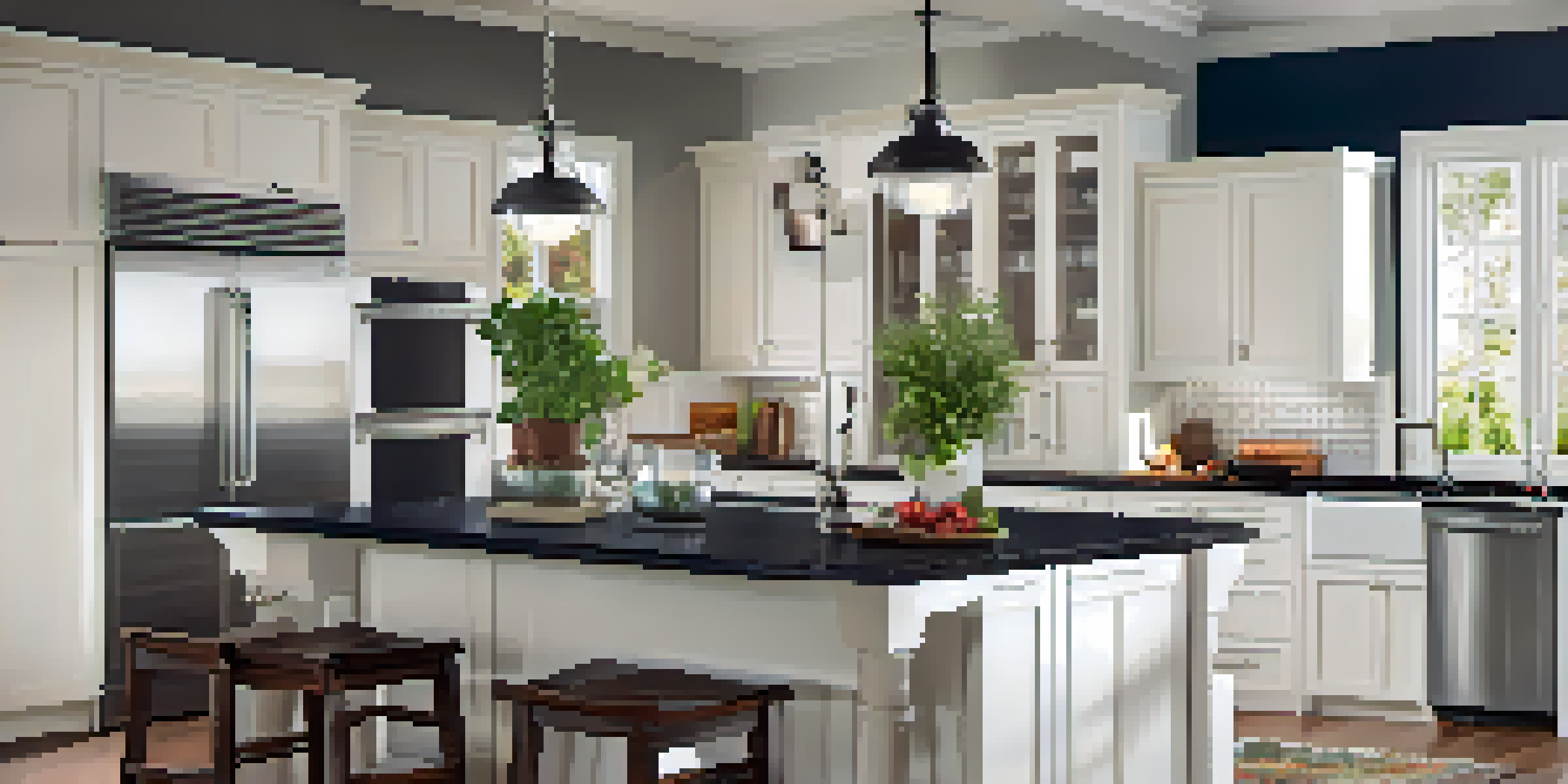Effective Budgeting for Home Renovations That Add Value

Understanding the Importance of Budgeting for Renovations
Budgeting for home renovations is crucial because it helps you prioritize your spending. Without a solid plan, you might find yourself overspending on less impactful upgrades. Think of budgeting as a roadmap; it guides you to make informed decisions that align with your goals.
A budget is telling your money where to go instead of wondering where it went.
Moreover, a well-structured budget can prevent common pitfalls, such as unexpected expenses that can derail your project. By setting a budget, you can allocate funds to essential areas and ensure that you are making the most out of each dollar spent. It’s like having a safety net that protects you from financial surprises.
Ultimately, effective budgeting not only aids in managing costs but also enhances the overall quality of your renovation. When you know exactly how much you have to spend, you can invest in materials and services that truly add value to your home.
Setting a Realistic Renovation Budget
To set a realistic renovation budget, start by evaluating your current financial situation. Consider how much you can comfortably afford without stretching your finances too thin. It’s important to assess your savings and any potential financing options, like loans or credit lines, which can provide additional support.

Next, research the average costs of the renovations you’re considering. Websites like HomeAdvisor or Angie's List can provide estimates based on similar projects in your area. This information is crucial; it’s like checking the weather before a trip—knowing what to expect helps you prepare better.
Budgeting Guides Renovation Success
A well-structured budget helps prioritize spending and prevents unexpected financial surprises during renovations.
Lastly, don't forget to include a contingency fund in your budget. Setting aside an additional 10-20% for unexpected costs ensures you won’t be caught off guard. This buffer acts as a safeguard, allowing you to tackle unforeseen issues without feeling overwhelmed.
Identifying High-Value Renovations for Your Home
When considering renovations, it’s essential to identify which updates will yield the highest return on investment (ROI). For instance, kitchen remodels and bathroom upgrades consistently rank among the top projects that boost home value. Imagine transforming your outdated kitchen into a modern space where family and friends gather—this not only enhances your enjoyment but also increases your home's appeal.
The best way to predict the future is to create it.
Another high-value renovation is enhancing curb appeal through landscaping or exterior improvements. A well-maintained front yard can make a lasting first impression, enticing potential buyers in the future. Picture your home standing out on the block with vibrant flowers and a freshly painted front door; it’s all about creating that inviting atmosphere.
Lastly, consider energy-efficient upgrades, like new windows or insulation. These renovations not only save you money on utility bills but can also be a strong selling point when it’s time to move. Homebuyers today are increasingly looking for energy-efficient features, making these updates a smart investment.
Prioritizing Renovations That Fit Your Lifestyle
While it’s tempting to chase trends, prioritizing renovations that align with your lifestyle is crucial. Think about how you and your family use your space daily. For example, if you love entertaining, investing in an open-concept layout might be a top priority. It’s about creating a home that works for you.
Additionally, consider your long-term plans. If you plan to stay in your home for several years, focus on renovations that enhance your comfort and enjoyment. Perhaps a home office or a finished basement for family gatherings would be more beneficial than a trendy outdoor kitchen that you may not use frequently.
Choose High-Value Renovations Wisely
Identifying renovations with the highest return on investment, such as kitchen and bathroom upgrades, enhances home value.
Ultimately, renovations should serve your needs first and foremost. By prioritizing what truly matters to you, you not only enhance your living experience but also add value to your home in a way that resonates with future buyers.
Finding Reliable Contractors for Your Renovation
Finding the right contractor can make or break your renovation project. Start by asking friends and family for recommendations; personal experiences can provide valuable insights. It’s like hunting for treasure—word of mouth often leads you to reliable gems.
Once you have a shortlist, take the time to research each contractor's credentials and reviews. Websites like Yelp or Angie’s List can offer ratings and testimonials from previous clients. This step is essential; it ensures you’re entrusting your home to someone reputable who will deliver quality work.
Finally, always get multiple quotes before making a decision. This not only gives you a better understanding of the market rate but also allows you to gauge the contractor’s professionalism and communication skills. Remember, a good contractor doesn’t just provide a low price; they offer value and reliability.
Navigating Permits and Regulations for Your Renovation
Before diving into your renovation, it’s crucial to navigate permits and regulations. Many home improvement projects require permits to ensure they meet safety and zoning standards. Think of permits as the building blocks of a safe renovation; they protect your investment and ensure everything is up to code.
Start by checking with your local government or planning office to understand what permits are necessary for your project. This may include building, electrical, or plumbing permits. It’s better to do this legwork upfront rather than face fines or delays later on.
Stay on Track with Your Budget
Regularly reviewing expenses and communicating with your contractor helps maintain control over your renovation budget.
If you're unsure about the process, consider consulting with your contractor. They often have experience with local regulations and can guide you through the permitting process. Having a knowledgeable partner can simplify this often-overlooked aspect of renovations.
Staying on Track with Your Renovation Budget
Once your renovation is underway, staying on track with your budget is vital. Regularly review your expenses against your original budget to identify any discrepancies. It’s like checking your GPS during a road trip; it helps you stay on course and avoid detours.
Communicate openly with your contractor about any changes or unexpected expenses. Transparency ensures that everyone is on the same page and can help you make informed decisions. If you need to adjust your budget, doing so collaboratively will foster trust and keep the project moving smoothly.

Additionally, consider utilizing budgeting apps or spreadsheets to track your spending in real time. These tools can help you visualize your budget and make it easier to spot areas where you might be overspending. The goal is to maintain control over your finances while still achieving the renovation of your dreams.